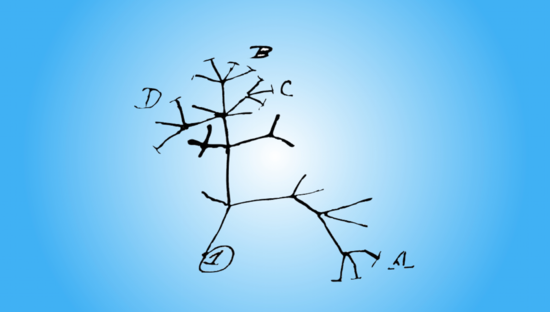22115 - Computational Molecular Evolution
- Overview

- This page contains links to video lectures, computer exercises, and other material for the course 22115 - Computational Molecular Evolution, which is part of the MSc in Bioinformatics and Systems Biology at the Technical University of Denmark. The course is taught by Professor Anders Gorm Pedersen, Section for Bioinformatics, Department of Health Technology.
- The main goal of this course is to give an introduction to theory and algorithms in the field of computational molecular evolution. We will cover basic evolutionary theory (common descent, natural selection, genetic drift, models of growth and selection), and the main types of algorithms used for constructing and analyzing phylogenetic trees (parsimony, distance based methods, maximum likelihood methods, and Bayesian inference). We will also discuss the role of statistical modeling in science more generally
- The course will consist of lectures, computer exercises, and mini-projects. The student will acquire practical experience in the use of a range of computational methods by analyzing sequences from the scientific literature.
Computer setup
Linux
Windows
MacOS
Lecture Schedule
Week 1 (January 31): Introduction to evolutionary theory and population genetics. Models of growth, selection and mutation
- Online lectures
- Computer exercise
Week 2 (February 7): Neutral mutations and genetic drift. Tree reconstruction by parsimony
- Online lectures
- Course material
- Computer exercise
Week 3 (February 14): Consensus trees. Distance matrix methods
- Online lectures
- Course material
- Computer exercises
Week 4+5 (February 21 + 28): Mini project 1
Week 6 (March 6): Models of sequence evolution. Likelihood methods
- Online lectures
- Course material
- exercise: Real, Observed, and Expected Change
- Handout exercise: Computation of Likelihood
- Slides, week 6
- Lecture notes: Substitution models
- Optional lecture notes: Matrix exponentials for Markov chains
- Computer exercises
Week 7 (March 13): Bayesian inference of phylogeny
- Online lectures
- Course material
- Computer exercise
Week 8+9 (March 20 + April 3): Mini project 2
Week 10 (April 10): Model Selection
- Online lectures
- Course material
- Computer exercise
Week 11 (April 17): Bayesian Phylogenetics, Part 2
- Course material
Week 12 + 13 (April 24 + May 1): Mini project 3: Final exam
Details will follow